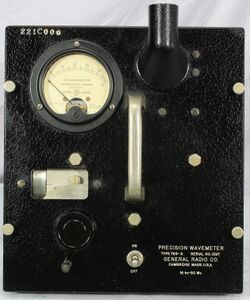724-A: Difference between revisions
(→Photos) |
No edit summary |
||
| Line 21: | Line 21: | ||
The Type 724-A is supplied as a collection of calibrated components sharing the same serial number. That is the capacitor, all the inductors, and calibration charts must have the same serial number to achieve the stated accuracy. The 724-A replaced the [[224-A]] Wavemeter with improved coils and a galvanometer replacing the thermocouple type indicator. The wavemeter is furnished with a wooden storage case, fitted with lock and carrying handle. This case has compartments for holding the capacitor, inductors, and calibration charts. The 724-A uses a 1G4GT/G Triode vacuum tube, resulting in the need for a 1.5 V battery for the heater. | The Type 724-A is supplied as a collection of calibrated components sharing the same serial number. That is the capacitor, all the inductors, and calibration charts must have the same serial number to achieve the stated accuracy. The 724-A replaced the [[224-A]] Wavemeter with improved coils and a galvanometer replacing the thermocouple type indicator. The wavemeter is furnished with a wooden storage case, fitted with lock and carrying handle. This case has compartments for holding the capacitor, inductors, and calibration charts. The 724-A uses a 1G4GT/G Triode vacuum tube, resulting in the need for a 1.5 V battery for the heater. | ||
Note: The instrument used in this article uses a 1LE3 loctal battery triode. It appears to be a production change. | |||
==Specifications== | ==Specifications== | ||
Revision as of 02:45, 29 May 2024
The General Radio 724-A Precision Wavemeter was introduced in Catalog J (1936) and remained available through Catalog K4 (1945).
The Type 724-A is an absorption type wavemeter whose range is from 17 kHz to 50 MHz using seven coils with an accuracy of ±0.25%. The primary application of the 724-A is oscillator and transmitter frequency measurement.
The capacitor used is similar to the Type 722-N Precision Capacitor. Its connected to the inductor through a Type 774 coaxial connector. Resonance is achieved using one of three methods, absorption method or reaction method and beat method. Using the panel galvanometer the the absorption method is employed. Regardless of the method, once resonance is achieved its a matter of using the correct chart for the coil in use to determine the frequency.
The Type 724-A is supplied as a collection of calibrated components sharing the same serial number. That is the capacitor, all the inductors, and calibration charts must have the same serial number to achieve the stated accuracy. The 724-A replaced the 224-A Wavemeter with improved coils and a galvanometer replacing the thermocouple type indicator. The wavemeter is furnished with a wooden storage case, fitted with lock and carrying handle. This case has compartments for holding the capacitor, inductors, and calibration charts. The 724-A uses a 1G4GT/G Triode vacuum tube, resulting in the need for a 1.5 V battery for the heater.
Note: The instrument used in this article uses a 1LE3 loctal battery triode. It appears to be a production change.
Specifications
- Frequency Range: 16 kHz to 50 MHz using seven inductors
- Accuracy: ±0.25% between 50 kHz and 50 MHz, 1% between 16 and 50 kHz
- Inductors: 7 coils wound on isolantite forms and enclosed in molded bakelite cases
- Capacitor: Precision worm-drive type similar to Type 722
- Resonance Indicator: galvanometer and vacuum tube rectifier combination





















